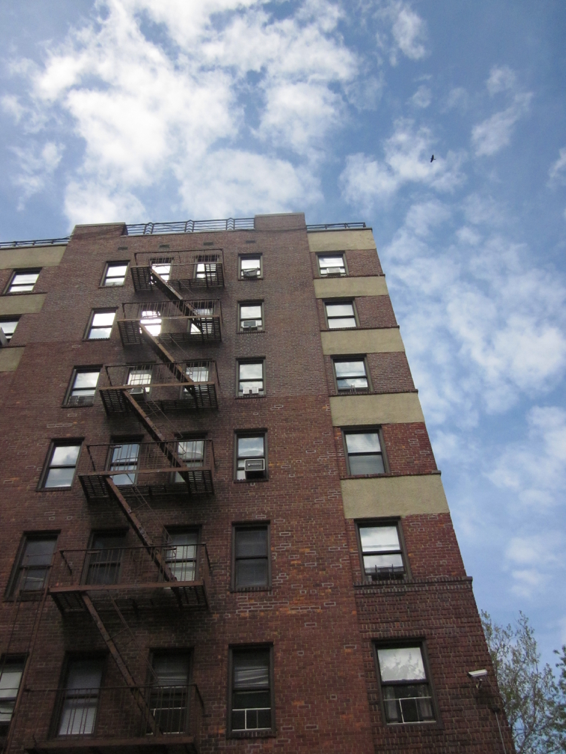
by C.O. Moed
No, My Jewish NYC Childhood Was Not Like a Movie
I once met a filmmaker in New York City who believed himself The Man of Lower East Sider-ville and A Serious Artist of the East Village.
He shaved his head, wore dirty clothes, and cried poor all the time, trying to put distance between his new rep and his real history—a nice upper middle-class childhood in the nice part of a nice city somewhere else.
Introduced as his friend’s new girlfriend, I watched his eyes take note and dismiss me—like Columbus dismissed everyone he ran into when he “discovered” the New World.
I remember smiling a lot and feigning interest in his “work,” which secretly I thought was dumb, but, fearing I was wrong, professed respect for.
One day, however, in a rare conversation he accidentally had with me, he found out that I had in fact grown up on the streets he was claiming as his own. And if I grew up there, it obviously meant I was Jewish.
I watched his eyes, and braced for the questions I was so used to getting:
- How did my JEWISH mother feel about me living in the East Village (because of course all she wanted was for me to marry a doctor or a lawyer)?
- How come I wasn’t married and was my JEWISH mother upset about that?
- What kind of eating disorder did I have?
This guy, however, being a filmmaker, couched his inquiry in the cinema.
“So, like, was it, like, Crossing Delancey?” Crossing Delancey is a film about an assimilated Jew-girl living uptown from the Lower East Side shtetl who falls in love with the epitome of a Christian man, all the while ducking her grandmother and friends’ attempts to marry her off to a Nice Jewish Boy, the Pickle Man. I really don’t think you could stuff more stereotypes into that movie, although at the time it came out, I was just grateful there was a movie where the main character, a Jewish woman, wasn’t a fat, shrill second banana.
I think I replied, “I don’t know what to say to that.” How could I, when a complex universe got reduced into a single-cell stereotype?
Luckily, my then-boyfriend dumped me (via email), and I was thus freed from further-like conversations with any of his friends.

It was only years later, after visiting my mother in the Lower East Side and looking up at my bedroom window facing Columbia Street, that what I should have said that day burst into my mind.
No, asshole. It is not, like, Crossing Delancey.
No, I am not from a movie where a Jew-girl runs uptown to escape from cartoon Bubbies and Yentas obsessed with finding nice Jewish boys for all the single Jewish girls. That movie treated those old women like a punch line.
The Bubbies and Yentas I grew up with had survived pogroms and the Holocaust and horrific poverty in tenements. They had suffered beatings by their husbands and they had buried their babies. They had worked 16 hours a day as maids, piecework seamstresses and pushcart vendors. They had watched their sisters and friends jump out of factory windows in a ferocious attempt to survive fire.
I didn’t have to Cross Delancey to know the world. And neither did my Jewish parents. Or my Jewish grandparents or many of our Jewish neighbors or their families or their daughters or their granddaughters.
We may have been Jewish. We may have been broke and we may have attended public schools. We may have lived on Grand Street or Broome Street or played on Willett Street.
We may have had strong accents that amalgamated Yiddish and Russian and New York and self-taught English.
We may even have been in more fistfights than other folk from other cities, because, at least on the Lower East Side, being Jew-girls often meant being a target.
But, whatever we were, we weren’t fucking punchlines to stupid jokes. We read the New York Times, the New Yorker and the Daily News. We studied Chekhov and O’Henry and Alcott and Malcolm X. We went to movies with subtitles.
We crossed ideas and we crossed cultures. We crossed from Mozart to Copeland to Led Zeppelin. We crossed from Lenin to Kennedy and back to Bella Abzug. We crossed to demonstrations and we crossed the police.
We never crossed picket lines.
And after all our crossings, we came home.
Every school day, I would march from PS 110 on the corner of Cannon and Broome to the corner of Columbia and Broome. There I would call up to the fifth-floor window. My mother would stick her head out, look up Columbia to make sure no cars were coming, and then wave me across.
I crossed Columbia that way every day so that my Jewish mother, who would have killed me if I brought home a doctor or a lawyer, could stay a few minutes longer at the piano to hone her craft and live in her art.
So, no, asshole. It is not, like, Crossing Delancey.
Even living “uptown” as I have for almost four decades, every day I cross from learning to art to expression to heart to healing to home to the universe of story unfolding before me. I still cross Columbia. Just like my mother taught me.
C.O. Moed grew up on the Lower East Side when it was still a tough neighborhood.
The views and opinions expressed in this article are the author’s own and do not necessarily reflect those of Lilith Magazine.